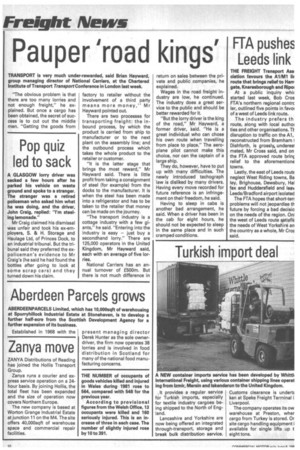Pauper 'road kings
Page 8

If you've noticed an error in this article please click here to report it so we can fix it.
TRANSPORT is very much under-rewarded, said Brian Hayward, group managing director of National Carriers, at the Chartered Institute of Transport Transport Conference in London last week.
"The obvious problem is that there are too many lorries and not enough freight," he explained. But once a cargo has been obtained, the secret of success is to cut out the middle men. "Getting the goods from factory to retailer without the involvement of a third party means more money," Mr Hayward pointed out.
There are two processes for transporting freight: the inbound process, by which the product is carried from ship to manufacturer or to the next plant on the assembly line; and the outbound process which takes the whole product to the retailer or customer.
"It is the latter stage that brings the most reward," Mr Hayward said. There is little profit from taking a consignment of steel (for example) from the docks to the manufacturer. It is when the steel has been made into a refrigerator and has to be taken to the retailer that money can be made on the journey.
"The transport industry is a cottage industry with a few giants," he said. "Entering into the industry is easy — just buy a secondhand lorry." There are 125,000 operators in the United Kingdom, Mr Hayward said, each with an average of five lorries.
National Carriers has an annual turnover of £500m. But there is not much difference in return on sales between the private and public companies, he explained.
Wages in the road freight industry are low, he continued. The industry does a great service to the public and should be better rewarded for it.
"But the lorry driver is the king of the road," Mr Hayward, a former driver, said. "He is a great individual who can chose his own route when travelling from place to place." The aeroplane pilot cannot make this choice, nor can the captain of a large ship.
They do, however, have to put up with many difficulties. The newly introduced tachograph law is disliked by many drivers. Having every move recorded for future reference is an infringement on their freedom, he said.
Having to sleep in cabs is another bad arrangement, he said. When a driver has been in the cab for eight hours, he should not be expected to sleep in the same place and in such cramped conditions.


























































